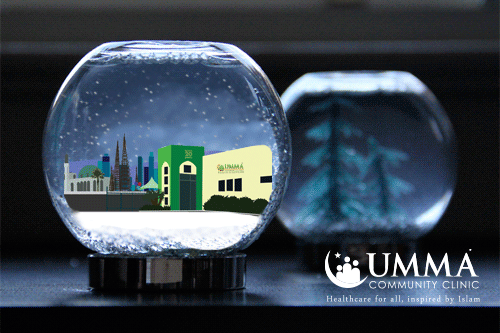By Uplifting Our Neighbors, We Are All Uplifted

As a child, I loved snow globes, transfixed by their simple beauty and the way in which they can transport one to a different world in miniature. When I grew up and started traveling around the world to places that I might only previously seen in snow globes, I began to collect them, and pass on my love of them to my son. I wanted him to experience the beauty and awe at seeing the landscape transformed in a serene microcosm, where a flurry of activity ultimately settles down into tranquility, a metaphor for childhood happiness and innocence.
But these days, as I gaze upon them, I find myself asking the same question posed by author Amruta Patil – “What is it about snow globes that makes them fascinating and terrifying at once?” Is it that the quiet, gentle snowfall that ends in the placid winter scene is brought into existence through furious shaking?

At this moment in time, amidst the political turmoil, social strife, and anxiety, both public and personal, I can’t help but think that UMMA is like a snow globe, encapsulating the nation’s anxieties, as our communities are shaken, society rattles and the social scenery changes.
At UMMA we are at the intersection of many intensely debated social issues, particularly the current hot-button trifecta of healthcare, immigration and civil rights. Our providers, our patients and our staff are all impacted personally and professionally by what has been occurring each day this year and by the looming changes. And I must note the word “looming” since so much of what we are experiencing is awaiting changes to come. There are many unknowns and during this time we must be firmly rooted, and at times we must draw upon those resources that allow us to be both kind and brave.
What we know about the healthcare field is that there is a desire by many in Congress to either repeal and replace or repair the Affordable Care Act. Which path, at this forked road, will Congress take? At this point we simply do not know, as there are currently at least five different bills on the table. A lot of the delay we’re seeing now is based on a disagreement over what precisely should be replaced, and what it will be replaced with. What we know is that the Affordable Care Act undeniably increased free or low-cost Medicaid coverage for people making less than 133 percent of the federal poverty level ― about $16,000 a year for a single person. Dignity was given to the poor so that they too could access healthcare. We also know that whatever changes comes next, whether it will replace or repair it, will impact either access to or affordability of health care, or possibly both. Can we as a nation afford to have the poor be without healthcare? Does that not put the health of the whole country at risk?
And what will these changes say about us as a nation, for as Vice President Hubert Humphrey once said, “the moral test of government is how that government treats those who are in the dawn of life, the children; those who are in the twilight of life, the elderly; those who are in the shadows of life; the sick, the needy and the handicapped.”
As our clinic is located in South Los Angeles we are very much aware of the anxiety that exists amongst its residents as to what may happen on our city streets. Will individuals be rounded up by immigration enforcement? Will kids come home to an empty house and have to depend on the kindness of strangers to get by? Instead of reading to their kids at night, do parents have to worry about getting their paperwork ready to transfer guardianship just in case they can no longer be here? All these questions and thoughts give rise to much consternation. In South Los Angeles we already have inter-generational community trauma linked with health outcomes such as heart disease. Again, can we as a nation afford to have such elevated anxieties? Does that not put the health of the whole country at risk?
As a Muslim-founded clinic, we have Muslim staff, including providers. We are not inured to the discussions surrounding the entry of refugees and Muslims into this country. As rooted in our faith as a clinic, we ache for all that are in pain. Furthermore, According to the American Medical Association, today there are about 280,000 international medical graduates in the U.S. A study published Feb. 3 in the journal The BMJ (formerly The British Medical Journal), shows Medicare patients treated by doctors with degrees from non-U.S. medical schools get just as good care — and sometimes better — than those treated by graduates of American medical schools. Again, can we as a nation afford to turn so many away from our country? Does that not put the health of the whole country at risk? Has not a diversity of origins, beliefs, traditions, and perspectives been one of the great strengths of our country and allowed us to become a beacon of hope for the rest of the world?
While UMMA represents this microcosm of the nation’s anxieties, it also serves as a protective snow globe where our patients can feel safe and protected. UMMA’s core values of service, ethical care, compassion, dignity and social justice means that it and its staff stand hand in hand with the community. We may be collectively shaken up at the moment, but we will stand firm and persevere. We began in the midst of local turmoil and we will carry through this national upheaval as well. Count on us and rely on our firm conviction that by uplifting our neighbors, we are all uplifted.
